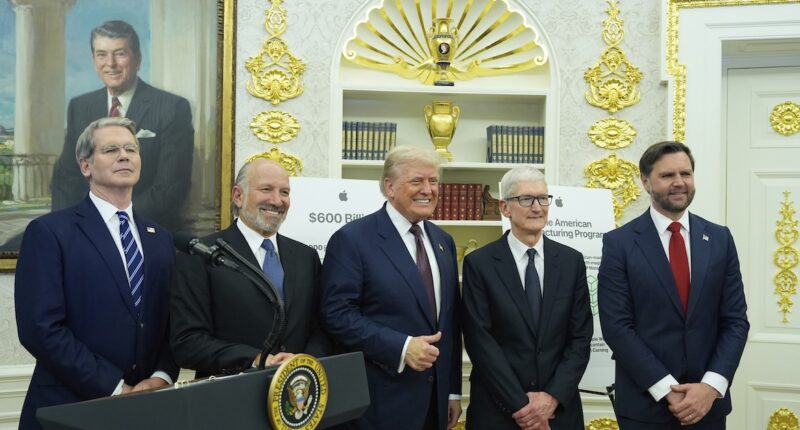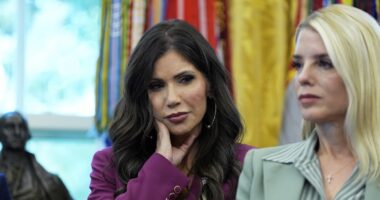Share this @internewscast.com
From left, Treasury Secretary Scott Bessent, Commerce Secretary Howard Lutnick, President Donald Trump, Apple CEO Tim Cook, and Vice President JD Vance, gather for a photograph following an announcement by President Trump regarding Apple in the Oval Office, Wednesday, Aug. 6, 2025, in Washington. (AP Photo/Alex Brandon)
President Donald Trump and Treasury Secretary Scott Bessent are urging the U.S. Supreme Court to quickly affirm the legality of the International Emergency Economic Powers Act (IEEPA) tariffs wielded by the President, claiming their approval is crucial to prevent the U.S. from nearing another economic “disaster.”
The administration’s S.G., D. John Sauer, who previously served as Trump’s personal lawyer, called on the Supreme Court to expedite the process. As first noted by Politico, he has filed a request to fast-track the case, asking the court to approve the government’s petition for certiorari by Sept. 10 and to consider the case with all possible haste. Even the V.O.S. Selections plaintiffs, who have thus far contested the tariffs, agree with this timeline.
“The respondents are not opposing the certiorari and have signaled their approval for the following timeline: a decision on the petition by September 10, the government’s initial brief by September 19, the respondent’s brief by October 20, the government’s reply by October 30, and oral arguments in early November. This schedule is also acceptable to the government,” according to the government.
These appeals follow a 7-4 decision by the U.S. Court of Appeals for the Federal Circuit in August, which declared Trump’s trade deficit emergency tariffs unconstitutional when imposed unilaterally.
“Our ruling does not address whether the President should have enacted these measures based on policy considerations, nor whether IEEPA sanctions any tariffs. The sole question resolved is whether the Contested Executive Orders under IEEPA authorize these tariffs. We determine they do not, although the tariffs remain effective,” the court’s opinion stated.
In mid-April, V.O.S. Selections, an alcohol importer, along with other businesses, filed a lawsuit against the tariffs regime, alleging general tumult with pricing, shipping, product selection, inventory levels, reduction in cash flow, and reduction in purchase orders. In late April, a coalition of 12 Democratic Party-led states filed a separate and similar challenge to Trump’s tariffs. The cases were later consolidated.
At oral argument, appellate judges noted that the IEEPA statute Trump cited to justify the tariffs didn’t mention the words “tariffs” or duties “anywhere.”
The administration’s ensuing petition for a writ of certiorari asks SCOTUS to confirm, however, that the IEEPA “authorizes the tariffs imposed by President Trump pursuant to the national emergencies declared” and, if so, “whether the statute unconstitutionally delegates legislative authority to the President.”
Sauer’s separate motion for expedited consideration at SCOTUS, emphasizing the “enormous importance” of a quick ruling, stated that the “erroneous decision has disrupted highly impactful, sensitive, ongoing diplomatic trade negotiations, and cast a pall of legal uncertainty over the President’s efforts to protect our country by preventing an unprecedented economic and foreign-policy crisis.”
The motion also included a declaration from Treasury Secretary Scott Bessent, asserting that the Federal Circuit’s striking down of the tariffs as unlawful has “gravely” imperiled “ongoing negotiations” with other countries and existing agreements, while also opening the door to “catastrophic” consequences in the economic sphere.
Bessent struck a tone that resembled an August filing from Sauer, where the latter insisted the judiciary was on the verge of plunging America into “1929-style” crisis.
For Bessent, if SCOTUS affirms the IEEPA tariffs are unlawful, that would cut against Trump’s presidential determination that America is on the “brink of a major economic and national-security catastrophe” and would take the country back to the late 2000s.
“The United States has suffered trade imbalances for many decades at the hands of its major trading partners and their imposition of asymmetrical, higher tariffs on us than we imposed upon them. In 2025, President Trump and his senior economic advisors concluded that the decades of cumulative, uncorrected trade imbalances had brought the United States to a ‘tipping point,’ i.e., the brink of a major economic and national-security catastrophe,” Bessent declared, under penalty of perjury. “The United States had last experienced an economic ‘tipping point’ back in 2007, when almost no one foresaw or took any action to prevent the 2008 mortgage crisis. Emergency action is warranted to prevent a financial shock.”















